- Home
- Naguib Mahfouz
Respected Sir, Wedding Song, the Search Page 2
Respected Sir, Wedding Song, the Search Read online
Page 2
Program for Work and Living
1. fulfillment of duties with care and honesty;
2. study of the Financial Bill as if it were a holy book;
3. studying for a university degree as an external student;
4. a special study of English and French, as well as Arabic;
5. acquisition of general knowledge, particularly of the kind beneficial to a civil servant;
6. demonstration, by every proper means, of piety and rectitude as well as diligence in work;
7. efforts to gain the confidence and friendship of seniors;
8. seizing useful opportunities without the sacrifice of self-respect. For instance: helping out someone in a position of influence, making useful friendships or a happy marriage conducive to progress.
He often looked at a small mirror which was nailed to the wall between the window and the clothes stand to examine his appearance and reassure himself on this point. Certainly his appearance would not be an obstacle. He was well built like the people of his alley. He had a dark, longish face with a high, clear forehead and well-trimmed hair. On the whole, his physique would qualify him to fill any position, no matter how important.
He drew courage and strength from the depths of his soul and thought to himself: Not a bad start—and the road is endless.
Four
The tryst on the edge of the wasteland was also sacred. He hastened to it with ardent heart and with the gaiety of one who has cast aside the heavy weight of life’s burden. There on the skirt of the desert stood the ancient, abandoned fountain at the foot of whose steps they would sit side by side in the infinite bosom of the afternoon. Before them the desert stretched as far as the foot of the mountain and silence would sing in its unknown tongue. Her dark brown color resembled that of the tense evening, a hue inherited from an Egyptian mother and a Nubian father who died when she was six. Their old companionship in the alley reached back into the remote past until it vanished into the very spring of life. When he looked into her big, wide eyes or saw her small, firm body brimming with vitality, he felt himself in the presence of an ideal which excited his whole being and awakened in his instincts a kind of humble yearning. She was his childhood friend in the alley and on the roof. Although hardly sixteen, she was considered a good housewife. In fact, she had been her mother’s only helper after all her seven sisters had married.
Sayyida smiled. Her face was always smiling, her eyes radiant and her limbs constantly moving with a sort of restless grace. Tresses of her thick, curly hair danced in the dry breeze coming down from the mountain. The silence was sweet. Breaking out of it she said, “My mother is pleased that you have joined the civil service…”
“And you?” he asked teasingly.
Her smile grew bigger, but she did not reply. He put his arm around her and their lips met, hers full, his sharply defined. No mention of love had been made between them, but whenever they were alone together they expressed it through kisses and embraces. She satisfied in him that aspect of his soul which craved the simple pleasures of life. He also loved her with his mind because he appreciated her virtues and her sincerity and had an instinctive feeling that she could make him happy.
“You are now a government employee…” Her voice disclosed her admiration and he kissed her again. “No one in our alley has ever achieved that,” she added.
All his friends worked in various manual trades. They watched him go by, whenever he passed, with admiration, and sometimes with envy. This would have pleased him had he not been acutely and bitterly aware of the long and difficult path ahead of him.
“You are the only white-collar worker!”
“Outside our alley that’s worth nothing,” he said quietly.
“Outside doesn’t matter. Our alley’s just a place for carts!”
He kissed her for the third time and said, “Never speak of carts without respect…”
“Well said! You are so noble…”
Her father had been arrested in the same brawl as his own brother. He went to jail, where he died of his injuries. However, these happenings were considered among the glories which made the good name of the alley. But Sayyida obviously had only one thing on her mind and it was no use ignoring it. There she was, asking the question: “And what next?”
He was aware of her yearning for a word that would set her heart at ease and make her happy. He knew too that on no account would his happiness be less than hers; it might even be greater. He loved that girl as she loved him and could not do without her. But he was afraid. He had to think a thousand times. He needed to refer to the bitter Work Program. He still had to ponder a long while on the life that lay before him, welcoming him and challenging him at the same time.
“What do you mean, Sayyida?”
“Nothing!” she answered lightly, but with an undertone of insistence.
“We shouldn’t forget we are young…”
“Me?” She said this with mild protest, hinting sweetly at the womanhood that cried aloud within her. “Grow your mustache. That’s what you need.”
He took her jest seriously and thought the idea could be of real help to him in his struggle. For who could imagine a senior official without a mustache?
“I will carry on with my education, Sayyida,” he said quietly.
“Do you need more education still?”
“A university degree.”
“What for?”
“A useful asset for promotion.”
“Will it take you long?”
“Four years, at least.”
With concealed anguish, he noticed an expression of coldness in her eyes, perhaps also of shame, with something of anger in it too.
“And what do you need promotion for?”
He laughed and kissed her hair but did not dare go beyond that. The scent of her hair reminded him of childhood games and a punch in the back when they were caught playing bride and groom. The darkness of night loomed over the hilltop and a sound of singing came from a distant gramophone.
“It seems promotion is more important than I imagined…”
He took her hand in his and murmured, “I will love you forever…”
What he said was the truth, a truth accompanied by a sense of dejection and grief; and he hated himself. He said to himself that life was a grand and awesome experience, but tiresome.
Five
He stood at his parents’ grave, lost among other countless graves, and recited the opening verse of the Qur’an. Then he said, “God have mercy upon you…”
Next he whispered to them in a spirit of gratitude, “Othman is now a respectable government employee taking his first steps on a difficult path, but he is resolved to follow it to the end.” He bowed slightly and added with humility, “All the good things I have I owe to the Lord and to you…”
A blind boy was reciting some of the shorter chapters of the Qur’an. He gave him a half-piastre. Yet, insignificant as the amount was, he still had that feeling of resentment which always possessed him when he gave someone money. When the boy was gone, he addressed his parents again: “Before God I vow to move you to a new grave when He has made my wishes come true…”
He had no idea how much of their dead bodies would remain with the passage of time, but he reckoned that there would be something remaining at any rate. To his surprise his thoughts reverted to Sayyida, and her smiling image took shape before his eyes. It seemed to him that she was on the verge of passing some pointed remark, outspoken and sarcastic. His heart contracted with pain and he murmured, “Guide me, Oh God, onto the straight path, for all I do is done at Your inspiration.”
He lived once again his father’s last days. There was no escape from this. Sickness and old age had crippled him till his only recreation was to sit on a sheepskin in front of the house, hardly able to see or hear. He would contemplate his helplessness, crying aloud in his grief, “Oh Lord, have mercy…”
In his day, he had been counted among the strong men of the alley. Throughout his
long life he had relied on the muscles of his arms and legs, toiling without a break and enduring to the end a harsh and poverty-stricken existence. His strength, which had nothing to nourish it, had been wasted; and in his misery he would break into a cackle of laughter, without meaning or reason. One evening he was found dead where he customarily sat on the sheepskin. So no one ever knew how death had come to him or how he had met it. As for his mother, her death was even more shocking. She had been doing the washing when suddenly she had bent over and begun to scream in terrible pain. An ambulance had come and carried her to Qasr al-‘Ayni Hospital, where she died during an operation for appendicitis.
His family was singularly victimized by death. Something inside told him that, for this reason, perhaps he himself would live long, and a wave of sorrow swept over him. Every manner of death was reasonable compared with his brother the policeman’s: a man big as an ox killed by the brickbats of the demonstrators. What a death! He had not known who they were nor had they known who he was. Othman regarded what had happened with the eyes of a spellbound spectator. It made absolutely no sense to him. True, he learned a lot from the perusal of history; he knew about history from the most ancient times up to the eve of the Great War. He knew about revolutions, but he had never lived them or reacted to them. He had seen and heard about things, but always kept aloof and wondering. No common sympathy had ever gripped his heart to draw him to the battleground; and he was always bewildered at the way groups of eminent statesmen and their supporters fought each other. He had been hounded all his life by poverty and hunger, and this had left him no time to extend the range of his thought to the outside world. The alley shut him in, its preoccupations unknown to everyone else, savage, violent, unending. Today, he was conscious of one goal only, a goal at once sacred and profane, which had nothing to do, as far as he could see, with the strange events that took place in the name of politics. He told himself that man’s true life was his inner life, which governed his every heartbeat and which called for toil, dedication, and enterprise. It was something holy, something religious, and through it he could achieve self-fulfillment in the service of the sacred apparatus known as the Government or the State. Through it the glory of man was accomplished on earth, and through man God’s will was accomplished on high. People applauded other, indeed quite contrary, things; but these people were foolish and fraudulent. So he never forgave himself for not having secured a full view of the Director General’s room and of his singular personality which set the entire administration in motion from behind a screen—in precise order and perfect sequence, recalling to the ignorant the stars in their courses and the wisdom of heaven. He sighed deeply. He recited the Fatiha once more and said by way of farewell, “Pray for me, Father!” He moved around the grave, whose two headstones had fallen and whose corner had cracked, and said, “Pray for me, Mother!”
Six
How wonderful is the turning year. He lived through its seasons, working without pause. Winter in the alley was pretty severe but it spurred a man to work; spring with its sandy khamsin wind was a curse, summer an inferno, and autumn a mysterious, meditative smile. He kept on working with an iron will and a burning passion. His law books were ranged under the bed and on the windowsill. He spent little of the night in sleep. He embraced ideas and wrestled with the inscrutable. Success alone was not enough to satisfy him. Friday was usually set aside for acquiring general knowledge worthy of directors and those in their service. He paid special attention to poetry and learned plenty of it by heart. He even tried composing it but failed. He told himself that poetry had always been the best means of currying favor with superiors and of shining at official parties. It was a heavy loss not to be able to write poetry. Still, learning it was at any rate the best way to perfect one’s prose. The art of public speaking was no less important for success than poetry, and eloquence was essential, so his heart told him. Even more so were foreign languages. All these branches of knowledge were useful, and there comes a time when their value goes up in the stock exchange of officialdom. For a civil servant did not live by financial regulations alone. Indeed, he must equip himself with a measure of everything useful, for who knew what might happen? He would tell himself that his life was an unbroken stream flowing in the direction of light and learning, loaded with its cargo of all sorts of novelties and fed by tributaries from the fields of thought: a stream carried forward by the intensity of faith, nobility, and human pride to reach in the end its estuary at the divine threshold.
As for peace of mind, that he attained on the steps of the ancient fountain, in the embrace of fervid love, in the arms of the pretty, loving girl, and her burning, virgin bosom. He allowed himself no commitment in word or deed. Yet he was as fond of her as of life itself. If only life could be satisfied with love and simple happiness, he thought. So anxious was Sayyida that she cast off her natural reserve. She no longer shrank from expressing her true emotions, or revealing the ardor of her yearning for him. On one occasion she said to him in a tone of reverence, “I cannot live without you.”
But her words were tepid compared with the generosity of her full lips. On another occasion she said, “You are everything to me: the past and the future…”
Her brown eyes glowed with fidelity, with apprehension, and with real yearning. And in the melting moment of a passionate embrace she sighed, “We lack something…”
“Our perfect love lacks nothing,” was his dull and selfish answer.
She shrugged her shoulders in protest, while seeking not to embarrass him. She thought it better to be patient with him and to preserve.
He found that he suffered from a fearful repression that could eventually place him at the mercy of the unknown. Thus he yielded to the temptation of a colleague who invited him to visit the official prostitutes’ quarter. As one of the breed of al-Husayni Alley, he did not lack the necessary courage. He walked ahead into a lane lit by two gas lamps standing wide apart and covered in so thick a layer of dust that the lane was sunk in that semi-darkness which arouses desire; and he looked excitedly from place to place until his eyes settled on a prey. Those visits were usually followed by a wholehearted plea for forgiveness and a prolonged resort to prayer and worship, the sort of thing he habitually did each time he faced up to his deeply hidden intentions toward Sayyida. Thus in addition to the hardship of continuous work, he suffered even harsher hardship from the pangs of conscience. His long exhausting nights would terminate in severe mental fatigue, almost to the point of fainting. And sometimes tears would come to his eyes almost without his realizing it.
Sa‘fan Basyuni, the Head of Archives, watched his work with both admiration and misgiving. He appreciated his perseverance, discretion, and good manners. But from the start he was uneasy about his Secondary Education Diploma, which set him apart in the Archives Section, and also about his ambition for further education that would raise Othman even higher above his own solitary Certificate of Primary Education. Othman became aware of this quite quickly but he counted on the man’s good nature and redoubled his efforts to ingratiate himself with him and comply with his every direction until Sa‘fan fully trusted him and opened his heart to him with rare candor. Thus in his spare time he would draw closer to Othman and speak his mind openly. Even in politics he disclosed his views and inclinations to him. So zealous was the man that Othman shrank from ignoring his interests or declaring his own cold neutrality toward them.
“The truth is,” he would say with wary ambiguity, “we are of the same turn of mind…”
Such words pleased the man in a way that Othman could not comprehend. The man’s involvement in such things amazed him. And more amazing was the involvement of his wretched colleagues. What was it that they found attractive in them? Had they not more basic worries to occupy their minds? But he told himself with no little scorn that they were people without a fixed aim in life, that their religious faith was only superficial and that they never thought enough of the meaning of life or of what God had created them fo
r. Thus their thoughts and their lives were wasted in empty amusement and sophistry and their true potentialities were dissipated without achievement. Illusions deceived them and they stood idle as time went by.
Seven
One day, after receiving the incoming mail from him, Sa‘fan Basyuni said, “Come and spend an evening at my place. You’ll enjoy it.” Despite some surprise and misgiving he did not think of declining. The man went on: “Our neighbors are having a wedding party. We’ll have an ox head for supper together and sit on the balcony to listen to the singing…”
He lived in a flat on the third floor of a block in al-Bahr Close in the Bab al-Shariya quarter. Othman found that he was the only person invited and felt gratified by the honor that his chief bestowed on him alone. They had together a delicious supper which consisted of ox tongue, brain, cheek, and eye, along with sausage, bready beef soup, and fried onions in addition to radishes and pickles, as well as melon for dessert. It was a superb and bountiful meal and he ate his fill. They sat on a balcony overlooking the courtyard of the house where the wedding took place. The courtyard was brightly lit by numerous pressure lamps. Inside were rows of chairs and sofas packed with guests. The gangways thronged with boys and younger children while scores of others pressed around the outside fence. Lights shone inside the house as well and women were seen coming and going. The whole place reverberated with voices of every pitch and kind; bursts of laughter and coughing as well as cries of joy resounded in the air. Othman was stirred by the wedding’s air of happiness and its heartwarming scents of sexuality and love. When the band struck up, he found it more moving than he expected or was accustomed to, for he did not like music particularly, though it was all right when it came his way. Indeed, music was not all that bad sometimes. It was something good and comforting. Marriage was a splendid relationship, a joy and a religious duty. A deep splendid sadness came over him.

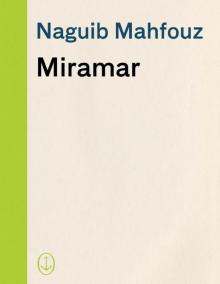 Miramar
Miramar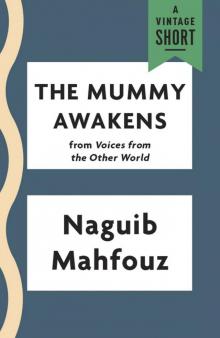 The Mummy Awakens
The Mummy Awakens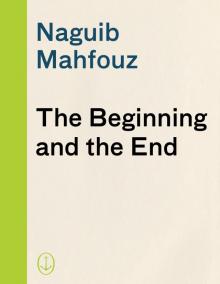 The Beginning and the End
The Beginning and the End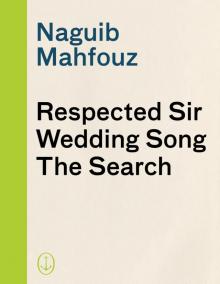 Respected Sir, Wedding Song, the Search
Respected Sir, Wedding Song, the Search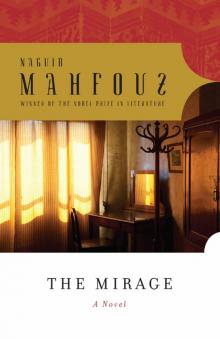 The Mirage
The Mirage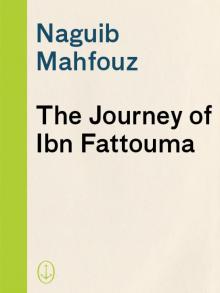 Novels by Naguib Mahfouz
Novels by Naguib Mahfouz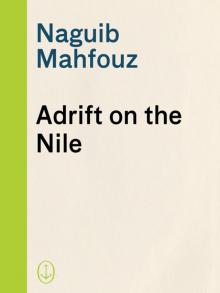 Adrift on the Nile
Adrift on the Nile Karnak Café
Karnak Café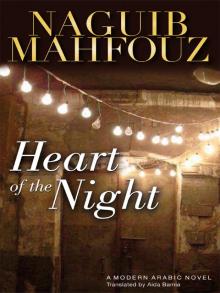 Heart of the Night
Heart of the Night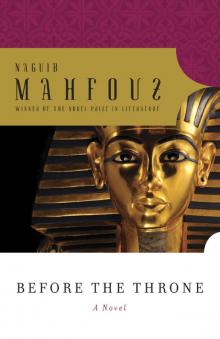 Before the Throne
Before the Throne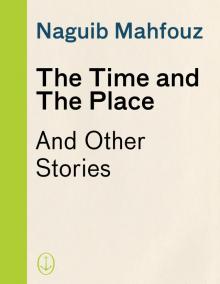 The Time and the Place: And Other Stories
The Time and the Place: And Other Stories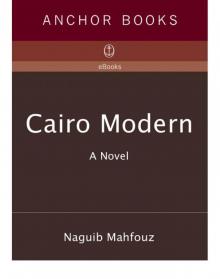 Cairo Modern
Cairo Modern Arabian Nights and Days
Arabian Nights and Days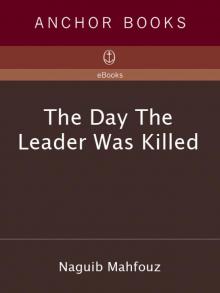 The Day the Leader Was Killed
The Day the Leader Was Killed Morning and Evening Talk
Morning and Evening Talk Three Novels of Ancient Egypt Khufu's Wisdom
Three Novels of Ancient Egypt Khufu's Wisdom Akhenaten: Dweller in Truth
Akhenaten: Dweller in Truth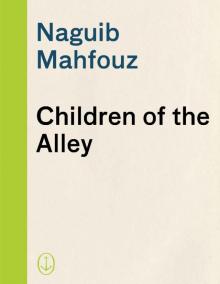 Children of the Alley
Children of the Alley Voices From the Other World
Voices From the Other World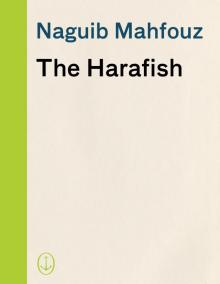 The Harafish
The Harafish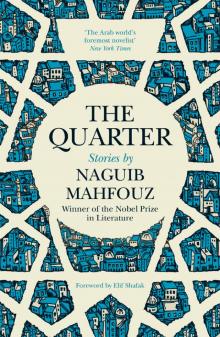 The Quarter
The Quarter The Seventh Heaven: Supernatural Tales
The Seventh Heaven: Supernatural Tales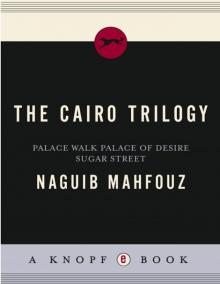 The Cairo Trilogy: Palace Walk, Palace of Desire, Sugar Street
The Cairo Trilogy: Palace Walk, Palace of Desire, Sugar Street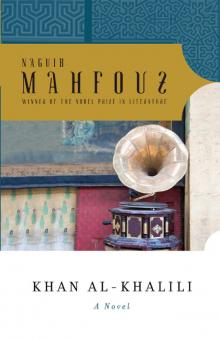 Khan Al-Khalili
Khan Al-Khalili Three Novels of Ancient Egypt Khufu's Wisdom, Rhadopis of Nubia, Thebes at War
Three Novels of Ancient Egypt Khufu's Wisdom, Rhadopis of Nubia, Thebes at War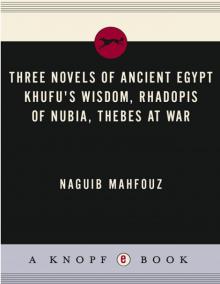 Three Novels of Ancient Egypt
Three Novels of Ancient Egypt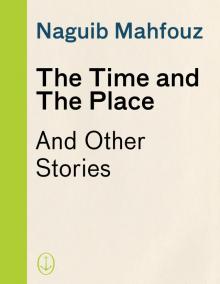 The Time and the Place
The Time and the Place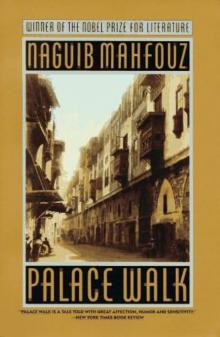 Palace Walk tct-1
Palace Walk tct-1 Akhenaten
Akhenaten The Seventh Heaven
The Seventh Heaven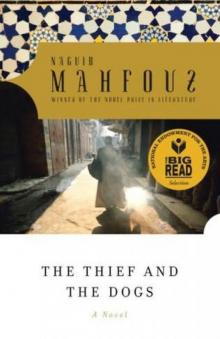 The Thief and the Dogs
The Thief and the Dogs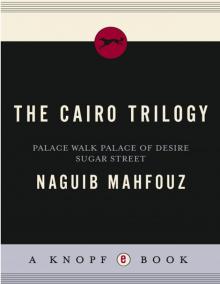 The Cairo Trilogy
The Cairo Trilogy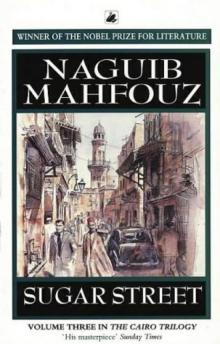 Sugar Street tct-3
Sugar Street tct-3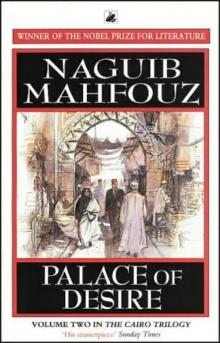 Palace of Desire tct-2
Palace of Desire tct-2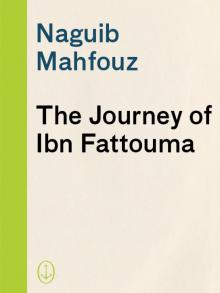 The Journey of Ibn Fattouma
The Journey of Ibn Fattouma